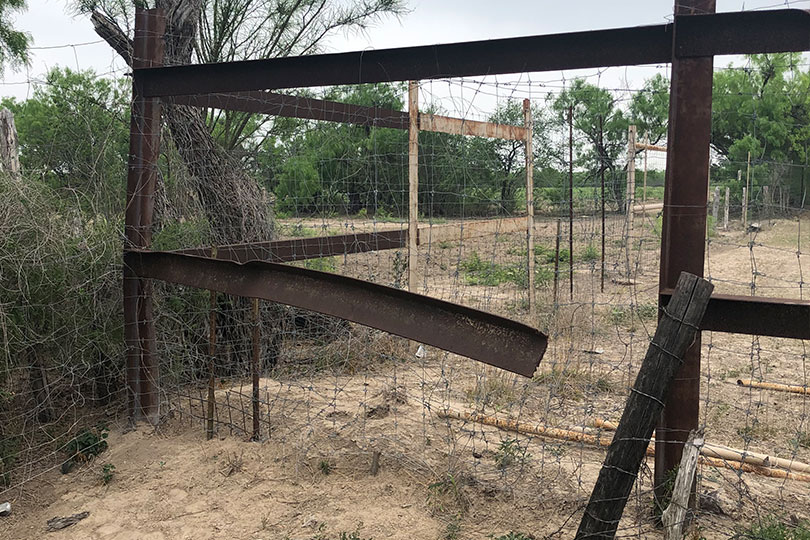By Jennifer Whitlock
Field Editor
Farm and ranch families and other property owners along the U.S.-Mexico border continue to suffer losses and damages caused by immigrants attempting to illegally cross into the U.S.
Cut fences, polluted water sources, damaged crops, harmed livestock, stolen vehicles and homes being broken into are commonplace. And little is being done by federal government officials to stem the tide of illegal immigrants or help those families left dealing with the destruction.
Legislation introduced by Reps. Stephanie Bice of Oklahoma and Tony Gonzales of Texas seeks to change this.
The Securing American Families from Exploitation at the Border (SAFE Border) Act would transfer $75 million of unobligated border construction funds, which have gone unused by President Joe Biden’s administration, to establish a grant program to reimburse families in border communities for their losses.
“Texas Farm Bureau members continue suffering devastating losses due to the surge in illegal immigration,” TFB President Russell Boening said. “Many hardworking farm and ranch families have shared examples of property damage, vandalization, stolen equipment, security concerns and more. We appreciate Congresswoman Bice for visiting the Texas-Mexico border to learn about these issues and introducing the SAFE Border Act to help provide needed assistance to landowners impacted by the border crisis.”
Under the bill, the Federal Emergency Management Agency (FEMA) would take the border construction funds to create the Southern Border Landowner Security Grant Program.
American families living in high-risk areas of the U.S.-Mexico border could use those funds to strengthen their physical security against property damage, theft or other losses. Landowners who have experienced those types of losses would also be eligible for compensation through the funds.
“Our farmers, ranchers and border communities are consistently fronting the bill for the crisis at our southern border. I hear from folks every day that share with me that the cost of the immigration crisis is only growing,” Gonzales said in a statement. “The Biden administration continues to turn a blind eye to the border crisis and it’s causing our communities to bear the brunt of the issue. This legislation will help to ensure that families are no longer having to pay for property repairs out of their own pockets.”
Illegal immigrants frequently travel in large caravans led by “coyotes,” or human smugglers who charge fees to guide them across Mexico and into the U.S. When they cross private property on foot, the caravans cut fences, trample crops, contaminate or drain vital livestock water sources and leave a trail of trash and discarded clothing and luggage behind.
Sadly, the coyotes often leave the weak and sick behind, too. In several heartbreaking instances, Texas Farm Bureau (TFB) members have found unaccompanied children—including infants—and extremely ill or dead immigrants on their lands.
Further damages occur when coyotes being pursued by CBP agents crash vehicles through fences or into buildings as they attempt to get away. Others have held families at gunpoint as they stole vehicles and looted homes.
“Earlier this year, I visited the Del Rio Sector of the border and saw with my own eyes the damage illegal border crossings continue to cause in our southern border communities. Something must be done to protect American citizens who live on or near the border,” Bice said. “Since the Biden administration has chosen to halt construction of the wall and refuses to effectively address the border crisis, Congress must find other ways to help people protect their property and this legislation will assist. Illegal border crossings continue to be a major issue in the states that border Mexico. This legislation provides a pathway to help landowners who are at risk or who have already been impacted.”
In Texas and other southwestern border states, residents and border enforcement personnel are seeing an unprecedented surge of illegal immigrants. Encounters by U.S. Customs and Border Protection (CBP) of unaccompanied minors, family units and single adults at the agency’s Big Bend, Del Rio, El Paso, Laredo and Rio Grande Valley sectors have grown steadily in recent years.
After rising in fiscal year (FY) 2019 to 626,562 encounters across Texas, stricter immigration policy in FY 2020 saw encounters dip to 244,326—about 39% of 2019’s total.
In just the first six months of FY 2021, encounters in the same sectors rose again to 368,466 people. The CBP website indicates data from 2021 are no longer being updated by sector. But if 2021 encounters remained on track at the same rate, total apprehensions in Texas would have been around 730,000—far higher than any year in recent history.
And encounters are up year-over-year from FY 2021 to 2022. Del Rio alone has seen a 232% increase from FY 21 to 22, while El Paso saw a 136% increase. Overall, southwest land border encounters, which includes California, Arizona, New Mexico and Texas, are up 129%.
TFB led efforts with the other southwestern border states, along with the American Farm Bureau Federation (AFBF), to bring attention to the border crisis.
For more information on how the ongoing border crisis impacts Texans, visit TFB’s Border Crisis webpage.


The reimbursement would e fine but outr representatives need to be doing more to put a stop to this invasion. We no longer feel secure in our homes and on our ranches. It’s looks living and working in an undesirable part of town….always alert to what might be “around the corner” or in this case, in the brush.